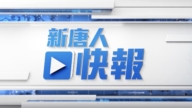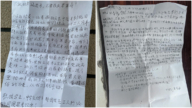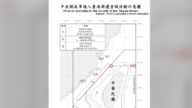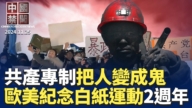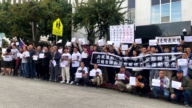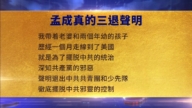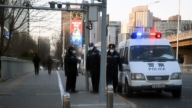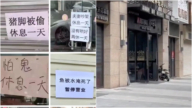【新唐人2013年02月25日讯】《维基解密》公布的一份密电显示,10年前,中共领导人胡锦涛、温家宝刚上台时,曾试图放松媒体管制、要求高官公布财产,但这些措施因为遭到既得利益集团的反对而受挫。下个月,中共当局将在北京召开全国“人大”与全国“政协”会议,与此同时,国家主席胡锦涛及国务院总理温家宝任期届满,将退休卸任,由习近平与李克强接班。但外界质疑,面对中共体制残局和越发严重的执政危机,他们究竟又能走多远?下面请看报导。
《维基解密》披露的这份保密(Confidential)电文,是由美国驻北京大使馆发往美国华府。美国中文网站《看中国》编译电文,内容揭示,2003年9月19号,美国官员和北京大学“政治发展与政府管理研究所”所长谢庆奎,曾经讨论了中国大陆当时的政治局势。
电文中,谢庆奎说,“胡温”新政府试图在政府及中共的运作上推动一些开放,以展示他们的亲民,也想给腐败“解毒”。
谢庆奎说:“胡温政府”还提出了要求高级别的政府官员及其家属公开财政状况的提案,但遭到中央政治局常委会的否决,其中只有胡锦涛和温家宝对这项提案投了赞成票。谢庆奎表示,这项措施尤其会威胁到高层领导人们的子女。
对此,原“中国人民公安大学”法律系讲师、资深法学专家赵远明向《新唐人》表示,大陆当局一再叫嚷要公布官员财产状况,但中共已经整体腐烂,因此这一提议在整个体制中遭到极大抵制。
原“中国人民公安大学”法律系讲师赵远明:“从这一点、从侧面就反映出,中共领导层已经彻底烂掉了。你如果没有大的决心、强力的手段,很难实现公布财产、廉洁奉公、宪政梦。”
北京时政观察人士华颇则指出,相对“胡温”当初而言,10年后的中共政权,面临空前的危机,中国已走到了巨变的前夜,因此“胡温”的继任者习近平、李克强为避免亡党,不断强调要加强反腐,并再次提出实行官员财产公开。
北京时政观察人士华颇:“我估计,习、李要以反腐为突破口,要进行一场正在精心布置的党内大清洗,以反腐为名清洗一些人,树立自己的威信。”
美国驻北京大使馆的电文还披露,胡锦涛当初曾采取一些小步骤给媒体“松绑”,但因为中共十六届三中全会即将召开,并且担忧对前中共党魁江泽民的批评,当局加紧了对媒体的管制,并禁止讨论“政改”。
华颇:“当初胡温上台提出了以人为本,让人耳目一新,对媒体有所放松,被人称作为‘小阳春’。但是这种放松,是以不能危害中共的核心利益为前提的,所以后来人们觉得突然间形势急转直下。”
赵远明则指出,目前虽然刘云山不再担任中宣部长,但在新任政治局常委分工中,刘云山仍然主掌文宣大权。
赵远明:“习、李要想在媒体上真正迈出开放自由比较大的步伐,就是要在人事上给它一种彻底的改变。刘云山就根本不应该让他插手宣传和媒体。”
赵远明强调,在最近的“南周事件”中,新任中宣部长刘奇葆还是听命于刘云山。因此,习、李如果没有得力人选去执掌中宣部、清除刘云山对中宣部的掌控和影响,将很难改变当前形势。
采访/刘惠 编辑/李谦 后制/周天
WikiLeaks: Hu-Wen’s Anti-corruption Was Rejected by Politburo Standing Committee
In a cable released by WikiLeaks stated that 10 years ago,
Hu Jintao and Wen Jiabao, then new Chinese communist leaders,
attempted to push openness in both media and officials’ assets.
However, vested interest groups rejected the initiatives.
As both National People’s Congress and the National
Political Consultative Conference are approaching,
President Hu Jintao and Premier Wen Jiabao
will retire soon.
People are skeptical about how far the new leaders
Xi Jinping and Li Keqiang will go with the collapsing communist regime.
The following is our report.
This Confidential released by WikiLeak was issued
by the U.S. Embassy in Beijing and addressed to the Secretary of State in Washington DC.
The content revealed a political scene discussion on Sept. 19,
2003 with director of Beijing University’s Institute of Political Development and Governance, Xie Qingkun.
It revealed that both Hu and Wen were “pushing for
greater openness in government and party operations
in order to promote closeness to the people and
as an antidote to corruption.”
Xie Qingkun reported that, “an initiative of the Hu-Wen
government to require financial disclosure statements from
high-level government officials and their families
was rejected by the Politburo Standing Committee,
with only Hu Jintao and Wen Jiabao voting in support
of the measure.”
Xie Qingkun said, “Such a measure would particularly
threaten the children of high-level leaders.”
Zhao Yuanming, former law lecturer of Chinese People’s
Public Security University, told NTDTV that this initiative was surely resisted by the collapsing Communist regime.
Law lecturer Zhao Yuanming: “This information reflects
the complete collapse of the Chinese Communist leadership.
It requires a big commitment and strength to publicize official
property, and to realize a clean and honest government.”
Current affairs observer Hua Po believed that China is facing
an unprecedented crisis and on the eve of great change.
Xi Jinping and Li Keqiang, the successor of Hu-Wen government,
have to stress anti-corruption and raise the issue of property
declaration 10 years later to avoid the end of the party.
Current affairs observer Hua Po: “I would assume that Xi
and Li will use anti-corruption to clean and rearrange within the party and to establish their own support."
The Confidential also revealed that “Hu had taken
some small steps to make the media more “relevant" after assuming office.”
However, media control was tightened to avoid discussions
of political reform for the upcoming October Party Plenum
and the concern about criticism of Jiang Zemin
in newspapers.
Hua Po: “When Hu Jintao and Wen Jiabao first came
to power, it was known as the “Little Spring” for they proposed people-oriented policy and less media control.
However, when the core interests of the Communist regime
are threatened, the situation worsens suddenly."
Zhao Yuanming pointed out that although Liu Yunshan
is no longer director of the Central Propaganda Department,
his Politburo Standing Committee position still entitles him
the power in propaganda.
Zhao Yuanming: “To ensure openness in media,
the organization has to go through a major change.
Xi and Li should not allow Liu Yunshan to continue
his influence in the propaganda and the media."
Zhao Yuanming stressed that the recent Southern Weekly
incident showed that newly appointed director of propaganda, Liu Qibao, still takes orders from Liu Yunshan.
As long as Liu Yunshan continues to control and influence
the Central Propaganda Department, it will be difficult to change the current situation.


